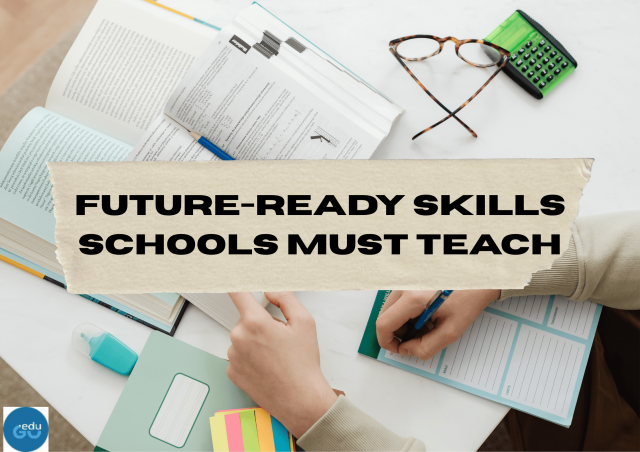In a rapidly changing world, academic excellence alone no longer defines student success. Schools are now expected to equip learners with a toolkit of essential skills that go beyond textbooks and exams. Boarding Schools in India, known for their holistic educational approaches, are increasingly leading the charge in preparing students not just for today—but for the uncertain world of tomorrow. These institutions recognize that students need more than good grades to thrive; they need to be future-ready.
Why Future-Ready Skills Matter
Today's students are tomorrow's global citizens, innovators, and leaders. But with emerging technologies, shifting job markets, and evolving societal needs, the future demands a different set of capabilities. Traditional rote learning is no longer sufficient. Future-ready skills foster adaptability, resilience, and innovation—qualities that employers and society increasingly value.
The Skill Gap is Real
Employers often report a disconnect between academic qualifications and practical skills. To bridge this gap, schools must prioritize competencies that allow students to:
-
Solve real-world problems
-
Communicate across diverse teams
-
Adapt to new tools and technologies
-
Lead with empathy and ethics
Top Future-Ready Skills Every School Should Teach
Here are the most critical future-ready skills that should be embedded into modern education systems:
1. Digital Literacy
With AI, automation, and big data becoming the norm, understanding how digital systems work is foundational.
Schools must teach students to:
-
Use digital tools effectively for collaboration and creation
-
Practice digital safety and privacy
-
Understand basic coding and data handling
-
Adapt to emerging technologies
2. Communication & Collaboration
The ability to express oneself clearly and work well with others is more valuable than ever in a hyper-connected world.
Focus Areas:
-
Public speaking and persuasive writing
-
Listening skills and empathy
-
Conflict resolution
-
Working in diverse, cross-cultural teams
3. Critical Thinking & Problem Solving
In the age of information overload and misinformation, critical thinking is a non-negotiable skill. Students must learn to analyze, evaluate, and create—rather than just consume.
Schools should encourage:
-
Asking questions instead of memorizing answers
-
Evidence-based decision-making
-
Scenario-based learning
-
Engaging in debates and discussions
4. Creativity & Innovation
Future workplaces will reward creativity—whether in art, engineering, or entrepreneurship. Schools must cultivate creative confidence and an experimental mindset.
How this can be taught:
-
Encouraging design thinking in projects
-
Allowing students to fail, reflect, and retry
-
Integrating art, music, and design into core subjects
-
Promoting student-led innovations and clubs
5. Emotional Intelligence (EQ)
EQ is the backbone of leadership and teamwork. It's the ability to understand and manage your own emotions and those of others.
Emotional intelligence includes:
-
Self-awareness
-
Empathy and compassion
-
Stress and conflict management
-
Building healthy interpersonal relationships
6. Financial and Entrepreneurial Literacy
Understanding how money works and how to start something from scratch—be it a business, project, or social campaign—is invaluable.
Schools should cover:
-
Budgeting and saving
-
Investment basics
-
Social entrepreneurship
-
Start-up simulation projects
7. Adaptability and Resilience
The ability to bounce back from failures and adapt to new situations ensures long-term success, especially in an unpredictable world.
Schools can foster this by:
-
Creating real-world challenge simulations
-
Emphasizing growth mindset
-
Teaching mindfulness and coping strategies
-
Offering extracurricular challenges that push boundaries
Role of Boarding Schools in Developing Future-Ready Students
Boarding schools naturally offer immersive, 24/7 learning environments that allow for integrated skill development. Students participate in community living, take on responsibilities early, and engage in diverse extracurricular activities that support the development of leadership, resilience, and independence. In Boarding Schools in India, for instance, students benefit from:
-
Structured schedules that blend academics with sports and arts
-
Mentorship and guidance outside classroom hours
-
Exposure to multicultural perspectives and diverse peer interactions
-
Leadership roles within student councils and residential groups
This unique ecosystem naturally cultivates the kind of future-ready mindset that modern education aspires to achieve.
Rethinking Assessment: From Marks to Mastery
To truly embed future-ready skills, schools must rethink how they assess learning. It's no longer enough to evaluate students based solely on standardized tests. Instead, assessments should reflect real-world challenges and skill application.
Modern assessment methods include:
-
Project-based learning evaluations
-
Peer reviews and self-reflections
-
Digital portfolios
-
Problem-solving exercises
How Parents and Educators Can Support This Shift
For a successful transition to future-ready learning, collaboration is key.
Parents can:
-
Encourage curiosity at home
-
Promote hobbies that build diverse skills
-
Support digital and financial literacy from a young age
Educators can:
-
Continuously upskill themselves
-
Personalize learning experiences
-
Create inclusive classrooms where diverse talents are valued
Conclusion: Teaching for Tomorrow, Today
The world is evolving—and so should our education systems. Equipping students with future-ready skills isn't an option; it's a responsibility. Schools must go beyond academic performance to nurture adaptability, empathy, innovation, and critical thinking. By doing so, they prepare students not just for careers—but for life.
As Boarding Schools in India have demonstrated, with the right learning environment, these essential skills can be seamlessly woven into daily education. The time to act is now—so that the learners of today become the capable, confident leaders of tomorrow.






